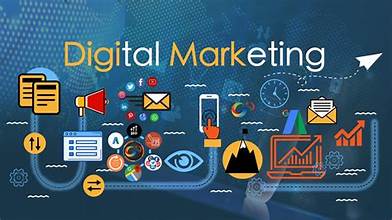
What is Digital Marketing |
Digital marketing refers to the use of digital channels, platforms, and technologies to promote products, services, brands, or businesses to reach and engage with target audiences. It encompasses a broad range of online marketing tactics and strategies aimed at driving awareness, traffic, leads, conversions, and customer loyalty. Digital marketing leverages the internet, mobile devices, social media, search engines, email, and other digital channels to deliver targeted messages to consumers. Here’s an overview of key components and strategies in digital marketing:
- Search Engine Optimization (SEO):
- SEO involves optimizing websites and online content to improve their visibility and ranking in search engine results pages (SERPs). It includes techniques such as keyword research, on-page optimization, link building, and technical optimization to increase organic (unpaid) traffic from search engines like Google, Bing, and Yahoo.
- Search Engine Marketing (SEM) and Pay-Per-Click (PPC) Advertising:
- SEM encompasses paid advertising efforts to increase visibility in search engine results through paid search ads. The most common form of SEM is PPC advertising, where advertisers bid on keywords and pay a fee each time their ad is clicked.
- Google Ads (formerly known as Google AdWords) is the leading platform for PPC advertising, allowing advertisers to create text ads, display ads, shopping ads, and video ads targeted to specific keywords, demographics, interests, and geographic locations.
- Social Media Marketing (SMM):
- SMM involves promoting products, services, or brands on social media platforms to build awareness, engagement, and customer loyalty. Popular social media platforms for marketing include Facebook, Instagram, Twitter, LinkedIn, YouTube, Pinterest, and Snapchat.
- Social media marketing strategies may include creating and sharing content, running paid advertising campaigns, engaging with followers, influencers, and communities, and analyzing social media metrics to measure performance and ROI.
- Content Marketing:
- Content marketing focuses on creating and distributing valuable, relevant, and consistent content to attract and retain a target audience. Content formats include blog posts, articles, videos, infographics, podcasts, ebooks, whitepapers, and more.
- Content marketing aims to educate, entertain, or inspire audiences, establish thought leadership, drive organic traffic, and generate leads by providing valuable information and solving users’ problems.
- Email Marketing:
- Email marketing involves sending targeted messages and promotional content to a subscriber list via email. It is used to nurture leads, build customer relationships, promote products or services, drive sales, and increase brand awareness.
- Email marketing campaigns may include newsletters, product announcements, promotional offers, event invitations, and personalized messages tailored to specific segments or stages of the customer journey.
- Influencer Marketing:
- Influencer marketing leverages the reach and influence of social media influencers, bloggers, vloggers, and celebrities to endorse products, services, or brands and influence purchasing decisions.
- Influencer marketing campaigns often involve collaborations, sponsorships, product placements, or affiliate partnerships with influencers who have a large and engaged following within a specific niche or industry.
- Analytics and Data-driven Marketing:
- Digital marketing relies on data and analytics to measure, track, and optimize campaign performance, ROI, and customer engagement. Tools like Google Analytics, Adobe Analytics, and social media analytics platforms provide insights into website traffic, user behavior, conversion rates, and campaign effectiveness.
- Data-driven marketing involves using data and insights to make informed decisions, personalize marketing messages, segment audiences, and optimize marketing strategies for better results.
In summary, digital marketing encompasses a wide range of online marketing tactics and strategies aimed at reaching and engaging with target audiences through digital channels and platforms. It is essential for businesses to have a comprehensive digital marketing strategy that integrates various tactics to achieve their marketing objectives and drive business growth in the digital age.



